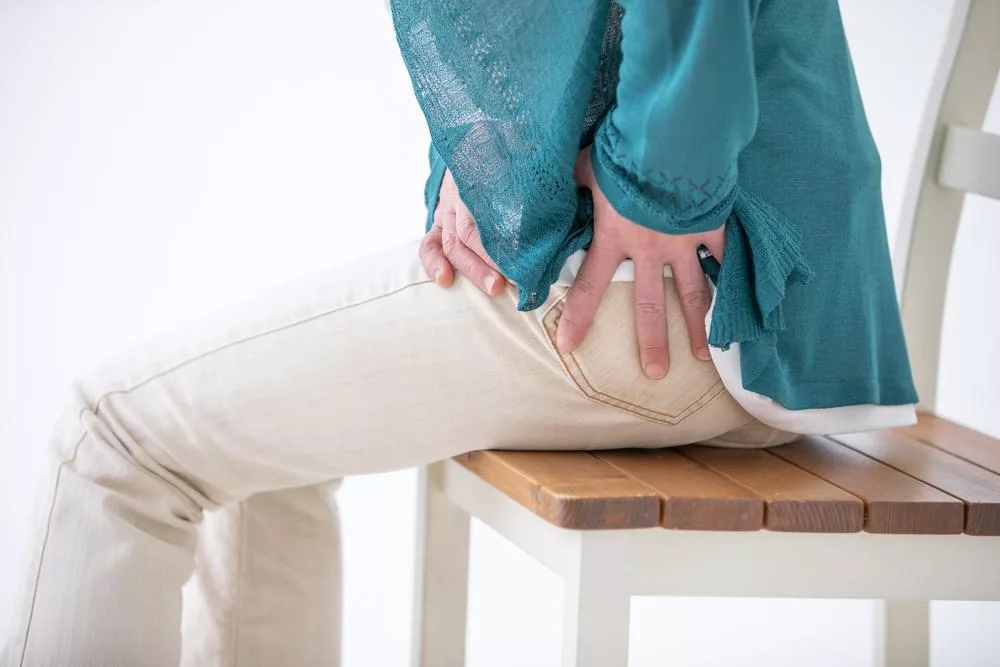Hip pain can be a debilitating condition that affects people of all ages and activity levels. While surgery may be necessary in some cases, there is a wide range of non-surgical treatment options available for both acute and chronic hip pain. Hip pain treatment without surgery can range from lifestyle changes and physical therapy to medication and injection therapies. Let’s explore common causes of hip pain, some of the non-surgical treatment options for hip pain, the benefits of chiropractic care, and how different treatment options can help people manage their pain and improve their quality of life.
What Are the Common Causes of Hip Pain?

There are several conditions that can result in hip pain. Here are five common causes of hip pain.
Muscle Strain
Straining or injuring the muscles around the hip can cause pain, especially during movement or weight-bearing activities. You could strain muscles in the hip from overuse, sudden movements, or using an improper technique during exercise.
Tendinitis
Tendinitis refers to the inflammation of a tendon, which is a type of tissue that connects muscle to bone. Overuse, injury, or certain medical conditions can cause tendinitis in the hip, leading to pain and discomfort.
Bursitis
Bursitis refers to the inflammation of a small fluid-filled sac, called a bursa, that cushions the hip joint. Overuse, injury, or infection can cause the bursa to become inflamed and painful.
Hip Fracture
A hip fracture is a serious injury that can occur in people of all ages, though it is more common in older adults. It often causes sudden and severe pain in the hip or groin area and requires immediate medical attention.
Osteoarthritis
Osteoarthritis is a common form of arthritis that affects the hips, and it is more likely to occur as people age. Osteoarthritis can cause the cartilage in the hip joint to wear down with time, which can result in pain, stiffness, and difficulty moving the hip.
How to Treat Hip Pain Without Surgery

Treating hip pain without surgery offers several benefits because non-surgical treatments are typically less invasive and involve fewer risks. Non-invasive treatment options for hip pain may also have fewer side effects and complications. You may also find that non-surgical treatments are often less expensive than surgery. Recovering from surgery can also be a lengthy process, but non-surgical treatments typically offer a faster recovery time. Check out these options for how to treat hip pain without surgery:
R.I.C.E. Method for Hip Pain
The R.I.C.E. Method is a common approach to managing pain and symptoms of acute injuries, including hip pain. R.I.C.E. stands for Rest, Ice, Compression, and Elevation. Resting the hip can help reduce pain and inflammation in the area while also giving your body a chance to heal. Applying ice to the hip can also help reduce pain and swelling; the cold sensation can also offer a temporary numbing sensation. Compression bandages or wraps around the hip can help reduce swelling while also providing support to the hip. Elevating the hip by propping up the affected hip with pillows can help improve circulation and reduce swelling.
Lifestyle Modification to Prevent Hip Injuries
Lifestyle modifications can be an effective way to manage hip pain and prevent future injuries. Some examples of lifestyle modification include exercise, focusing on proper posture, wearing proper footwear, and weight management. Regular exercise can help improve hip strength, stability, and range of motion in the joint. Maintaining proper posture throughout the day can also go a long way toward reducing pressure and stress on the hips.
Pain Medication for Hip Pain
Pain medication can be a useful tool in managing hip pain, typically in conjunction with other treatment modalities. When pain is acute or severe, pain medication like nonsteroidal anti-inflammatory drugs (NSAIDs) can help relieve hip pain by reducing inflammation in the area and temporarily blocking pain signals. Hip pain can also prevent you from getting a good night’s sleep, and pain medication can improve your sleep quality by reducing your pain signals and promoting relaxation.
Physical Therapy for Hip Pain
Physical therapy can also offer effective treatment for hip pain, especially when hip pain is chronic or related to a musculoskeletal injury or issue. Physical therapy can help reduce your hip pain through stretches, exercises, and other techniques that target hip strength, flexibility, and mobility. A physical therapist will create an individualized treatment plan using a combination of exercises and education as you learn how to move and exercise safely.
Hip Injections for Hip Pain
Hip injections for hip pain can be a helpful option when the pain occurs because of inflammation or arthritis. A hip injection may contain an anti-inflammatory medication, like corticosteroids, which reduce inflammation and result in reduced pain for a longer period of time than traditional oral medications. Hip injections can also improve hip function, making it possible to participate in activities that may have been avoided due to pain.
Chiropractic Treatment for Hip Pain
Chiropractic treatment for hip pain can be a highly effective all-natural treatment option. Chiropractors address issues and injuries that impact the whole body, including acute and chronic hip pain. Chiropractic adjustments, therapeutic massage, soft tissue mobilization, and more techniques can help reduce pain in the hip joint by realigning the joint and its surrounding tissues. Improving joint mobility with chiropractic care can help reduce stiffness while also addressing underlying issues.
How Do You Know When Hip Pain Is Serious?
Hip pain is not uncommon, though there are certain signs and symptoms of hip pain that require immediate medical attention. Here are some signs your hip pain may be serious:
Severe Pain
If your hip pain is sudden and severe, you may not be able to put weight on the affected leg. This could be a sign of a fracture or dislocation and will require immediate medical attention.
Severe Swelling
If your hip is swollen, red, and warm to the touch, this is a sign of severe inflammation or infection in the joint. Severe swelling of the hip joint will typically require immediate medical evaluation and treatment.
Fever
If you develop a fever along with hip pain, this could be a sign of an infection. Seek medical attention right away for fever along with severe hip pain or any other symptoms listed here.
Limited Range of Motion
If you have trouble walking, standing up, or moving your affected hip or leg, you may have a serious underlying condition that needs prompt treatment.
Manage Hip Pain with Affordable Chiropractic Today
Experience for yourself how you can get hip pain treatment without surgery when you schedule an appointment today at Affordable Chiropractic Killeen. Our Killeen chiropractors will provide you with a personalized treatment plan to address the source of your hip pain and take a whole-person approach so you can experience long-lasting pain relief.

